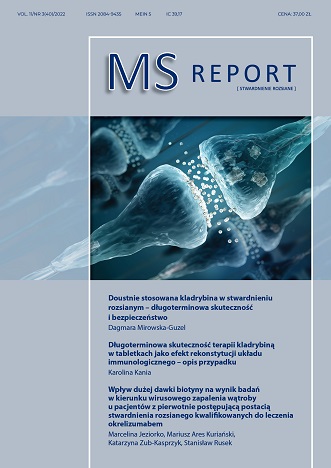High dose biotin impact on HBc test results in patients with primary progressive multiple sclerosis qualified for ocrelizumab treatment Original article
Main Article Content
Abstract
Ocrelizumab is the first disease modifying drug approved for use in primary progressive multiple sclerosis. In Poland, it has been available to patients within a drug program financed by the Polish National Health Fund since November 2020. Until ocrelizumab became available, other therapeutic approaches had been tried in primary progressive multiple sclerosis patients, including high doses of biotin administered orally. Ocrelizumab treatment may lead to reactivation of latent HCV or HBV infections. Some immunoassays, including ones widely used in detecting antibodies against hepatitis viruses, utilize a streptavidin-biotin complex reaction, and can give false positive results in patients with high serum biotin concentration. In this paper we want to present our experiences with primary progressive multiple sclerosis patients treated in the Neurology Department of Ludwik Rydygier Specialist Hospital in Krakow, in which high doses of oral biotin led to false positive anti-HBc total results in patients with primary progressive multiple sclerosis during their qualification for ocrelizumab treatment.
Article Details
Copyright © by Medical Education. All rights reserved.
References
2. Tourbah A, Lebrun-Frenay C, Edan G et al; MS-SPI study group. MD1003 (high-dose biotin) for the treatment of progressive multiple sclerosis: A randomised, double-blind, placebo-controlled study. Mult Scler. 2016; 22(13): 1719-31. http://doi.org/10.1177/1352458516667568.
3. Montalban X, Hauser SL, Kappos L et al; ORATORIO Clinical Investigators. Ocrelizumab versus Placebo in Primary Progressive Multiple Sclerosis. N Engl J Med. 2017; 376(3): 209-20. http://doi.org/10.1056/NEJMoa1606468.
4. Mikulska M, Lanini S, Gudiol C et al. ESCMID Study Group for Infections in Compromised Hosts (ESGICH) Consensus Document on the safety of targeted and biological therapies: an infectious diseases perspective (Agents targeting lymphoid cells surface antigens [I]: CD19, CD20 and CD52). Clin Microbiol Infect. 2018; 24 Suppl 2: S71-S82. http://doi.org/10.1016/j.cmi.2018.02.003.
5. Piketty ML, Prie D, Sedel F et al. High-dose biotin therapy leading to false biochemical endocrine profiles: validation of a simple method to overcome biotin interference. Clin Chem Lab Med. 2017; 55(6): 817-25. http://doi.org/10.1515/cclm-2016-1183.
6. Pourcher V, Todesco E, Dubois C et al. False hepatitis B and C viral serologies in patients with multiple sclerosis receiving high-dose biotin. Mult Scler. 2020; 26(2): 257-8. http://doi.org/10.1177/1352458518818294.
7. Kodani M, Poe A, Drobeniuc J et al. Determination of potential biotin interference on accuracy of results of serologic assays for various viral hepatitis markers. J Med Virol. 2020. http://doi.org/10.1002/jmv.25880.
8. Wolinsky JS, Arnold DL, Brochet B et al. Long-term follow-up from the ORATORIO trial of ocrelizumab for primary progressive multiple sclerosis: a post-hoc analysis from the ongoing open-label extension of the randomised, placebo-controlled, phase 3 trial. Lancet Neurol. 2020; 19(12): 998-1009. http://doi.org/10.1016/S1474-4422(20)30342-2. Erratum in: Lancet Neurol. 2020 Nov 17.

